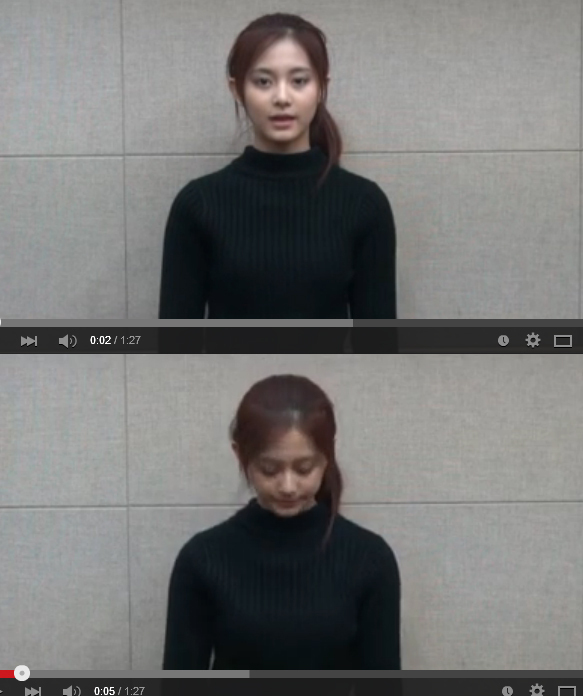JYP Entertainment, the smallest of Korea’s three main entertainment agencies, is under fire for its handling of the controversy surrounding Taiwanese K-pop star Tzuyu, in which the company made a politically charged statement.
The agency’s official homepage was down yesterday and its shares fell nearly to 4,000 won ($3.30) when the stock market opened Monday, down from a 52-week high of over 6,300 won. It closed at 4,300 won. Tzuyu is part of JYP’s multinational nine-member girl group Twice, which debuted last year in Korea.
 |
Tzuyu (second from right) poses with her K-pop girl group Twice. (Official Facebook) |
The Taipei Mission in Korea criticized singer Park Jin-young’s company, saying that it should not have apologized for its star waving her national flag, and that cultural figures should not become involved in politics.
“It is the right of an individual to hold one’s national flag. While the Chinese Communist Party has been using its current national flag for some 67 years, but the Kuomintang (Chinese National Party) of Taiwan has been using its flag nearly 100 years. Taiwan’s sentiment toward Korea has turned sour,” said an official from the Taipei Mission in Korea.
China’s Communist Party mouthpiece People’s Daily said on its microblog that its “One China policy” remains the same, and “cannot be challenged.”
The Chinese Embassy in Seoul did not respond to requests for comment.
JYP said in a press statement that Tzuyu will issue her position on the matter after closely consulting with her parents.
Observers say that although the latest situation is unlikely to ignite a diplomatic row involving China, Korea and Taiwan, it may adversely affect regional sentiment toward Korea’s K-pop or entertainment industry.
“Other agencies such as SM and YG are closely watching the situation as it could affect their stars’ activities in China, which roughly accounts for about 40 percent of the talent industry’s overall business on average,” said an industry insider.
“The sentiment could worsen to a similar situation where Koreans in the past disliked anything related to Japanese popular culture.”
An official from SM, a rival entertainment agency, said that the company had nothing to say at the moment, while YG could not be reached for comment.
Analysts say that JYP, which is traded on the tech-heavy KOSDAQ, has already seen its business affected following the furor.
 |
JYP’s K-pop star Tzuyu apologizes to China in a YouTube video posted Friday for waving a Taiwanese flag. (Yonhap) |
Facing rising negative sentiment in both China and Taiwan, JYP canceled idol group 2PM’s performance in China scheduled for Wednesday. Meanwhile, over 50,000 are expected to take to the streets in Taiwan on Sunday to protest against China and Tzuyu‘s apology to China, which allegedly came under pressure from JYP. JYP suspended Tzuyu’s activities in China, and LG Uplus, Korea’s smallest of the big telecom operators, halted the online advertisements of Huawei Y6 smartphones starring Tzuyu.
JYP is a small-cap company that made a turnaround in 2014 for the first time in four years. It earns annual net income of less than 10 billion won.
JYP recently issued an apology, saying that Tzuyu was not promoting Taiwan’s independence from China, after a couple of Chinese singers raised issue with Tzuyu’s waving of the Taiwanese flag during a broadcast in Korea. The agency added that it supported the “One China policy.” Tzuyu also posted a YouTube video Friday night apologizing for waving the Taiwanese flag, adding that she is proud to be a Chinese.
“This could be viewed as a complex issue on a state level because, geopolitically, Korea has to think about its relations with China, Taiwan and the U.S. at all times,” said a legal expert specializing in dispute resolution.
Annual trade in cultural content between Korea and China stands at around $150 billion, with China recently increasing its influence through investments in equities and joint productions in the Korean entertainment content industry, according to the Korea Creative Content Agency.
A number of Korean entertainment companies, including SM and YG, have been sealing deals with Chinese content producers and distributors such as Tencent to increase the exposure of their stars and music to an audience of some 1.3 billion Chinese as part of their global expansion.
By Park Hyong-ki (
hkp@heraldcorp.com) and Joel Lee (
joel@heraldcorp.com)









